23 de junio 2023

Children of Exile: The Births “Sowing Hope” in the Camp of Nicaraguan Farmers

PUBLICIDAD 1M
PUBLICIDAD 4D
PUBLICIDAD 5D
As its population slowly attempts to return to normal, daily bombardments remind them that they are at war
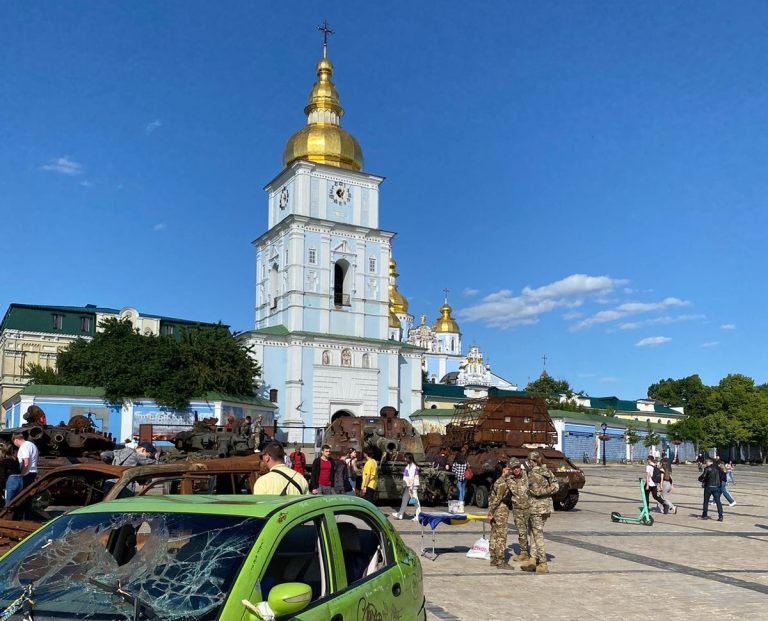
Traveling museums portraying the war have been installed in many public spaces in Ukraine. Photo: Yader Luna | Confidencial
From Kyiv, Ukraine — It’s 2:42 in the morning. I’m on the train from Poland to Ukraine, the only means of transportation since the beginning of the war. Arrival time is approximately seven o'clock in the morning on May 28. The swaying of the train wakes me to a message on my cell phone: “The air defense forces have already destroyed more than 20 unmanned aerial vehicles moving towards Kyiv. But a new wave of drones is coming to the capital.” That's enough to keep me awake for the rest of the journey.
Arriving in Kyiv, the capital of Ukraine, it’s Sunday and the streets look empty. The authorities confirm that during the night they were able to control the “most important” drone attack launched on the capital since the beginning of the Russian invasion, already 15 months ago.
“A record number of launched explosive drones was recorded - 54 in total!” the Ukrainian authorities reported on Telegram, claiming to have “destroyed 52.” At least some 40 were launched over Kyiv, resulting in two people killed and three injured.
The air alert lasted five hours. That's why it takes a while for the city to wake up. But as the sun warms and the hours pass, the streets start to fill up. Cafes look crowded, people walk their dogs, women walk with their children, and clothing stores are full of customers. Ukrainians try to lead a “normal” life.
“It's a way to defeat the Russians, to let them know that we are here in our country and we are not going to let them steal our land,” Maksym Shaposhnyk, a young man drinking beer on a terrace filled with more people his age, tells me.
The war took one of his best friends away from him, Mykola Kurochka, a 25-year-old killed on May 28, 2022, just four days after the invasion began. “He has a Wikipedia page to honor his memory,” he tells me as he shows me his photograph.
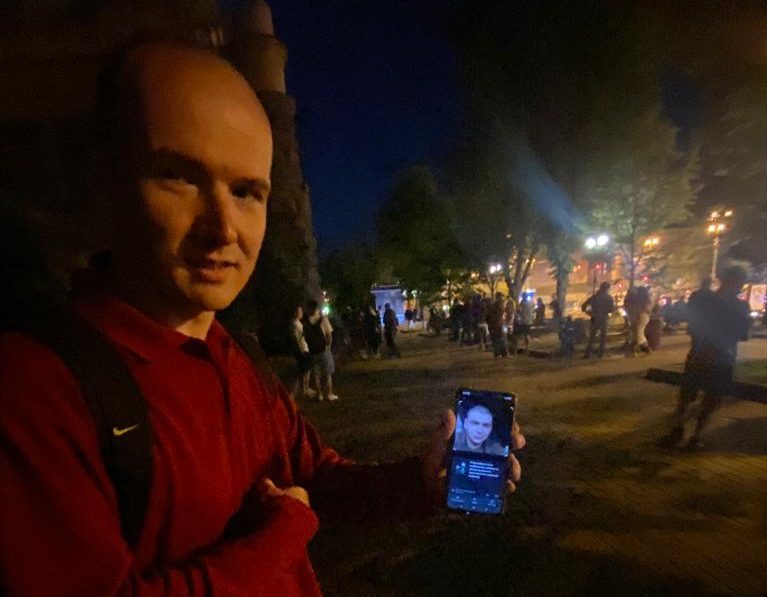
“We always got together to play soccer, we went to school together and we were neighbors,” he shares. He says that he knows that at some point he will be called to fight. “Maybe I'll look for the least dangerous option and for a good salary of about $3,000 a month, I'm really starting to consider it,” he jokes.
The bars on Jreschátyk Street, one of the main streets in the center of Kyiv, start to close. The curfew begins two hours later and the streets remain completely empty until five o'clock in the morning when people can go out again. But the night is only just beginning for Ukrainians.
For the citizens of Kyiv, May was the worst month in terms of Russian attacks. The Russians launched missiles and drones almost every night. “It's impossible to sleep like this,” says a young Ukrainian man in a TikTok video, using a filter that makes him look like he has terrible dark circles under his eyes. It’s nothing far from reality. There are dozens who use social networks to laugh at their tragedy. There are also those who share videos of their dogs trembling with fear at the sound of the downed missiles. There’s also the case of some students who shared images of their prom which was held in a shelter while the city was bombed.
“All Ukrainians are feeling these attacks in their daily lives,” explains Oscar Sluschenko, a young man who works as a volunteer providing psychological care to Ukrainian citizens.
He details that “there is a lot of anxiety in the heads of children and adults” and there are days when people “don't want to do anything.” On the streets, people always talk about the war. “It is a recurring theme,” he explains.
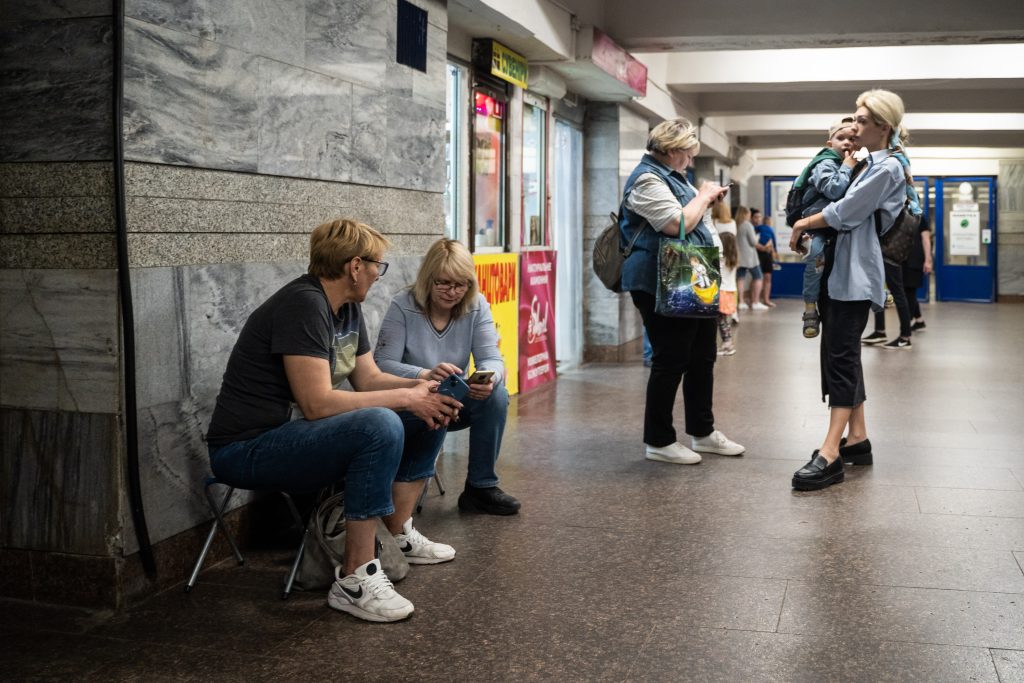
This young man, who also worked as a bartender in Brazil a few years ago, says that the image of Ukraine abroad is that they believe that “there are bombings in all cities, at the same time.” But the truth, he confesses, is that “In a year and a half, Ukrainians learned that life must go on and we do ordinary things even if it’s at a different pace, but we need that to live.”
However, the alarms that alert citizens to protect themselves in shelters sound almost every night and sometimes even in the daytime, reminding them that the war is not over yet. “The longest and most complex of the last hundred years,” as the Ukrainian president, Volodymir Zelenski, described in an interview with CONFIDENCIAL.
In Kyiv, it has become common to hear the sound of a siren throughout the city. In those moments some establishments, including hotels, announce through loudspeakers to look for the nearest “shelter.” Alerts also come through apps such as Telegram, a great ally to inform about what is happening in the country.
Most of the attacks are at night, but sometimes they happen at other times of the day. “It's psychological warfare too,” Kristina Bohdiazh, the interpreter accompanying me, tells me.
I was with her, finishing an interview with a teacher who survived a Russian attack in the early days of the invasion when the alarm began to sound. We have 15 minutes to protect ourselves. We decide to leave the school, which has its own shelter, to find the nearest subway station.
“Air raid siren cleared. Watch for reports and return to shelter if the siren sounds again,” is the message that comes over the city's official channel when the alert ends. Sometimes the attacks last minutes, other times eternal hours.
Sometimes you have to try to sleep inside the shelters, which are full some nights, while other times there are only a few people. Other times, exhaustion takes over and there is no alarm that can wake you up. In my case, that only happened once. There are loudspeakers in every room of the hotel warning you about every alert. Whoever you talk to warns you that there are many Ukrainians who have started to ignore the alarms. “It's a mistake to be confident,” they remind you.
All united by the war
There is no one in Ukraine who is not doing something to help their country in the face of the invasion, from helping neighbors who were left homeless or donating while purchasing fuel or donating in stores to help the Ukrainian defense.
Taras Chmut is the director of the Come Back Alive Foundation, which raises funds and provides support to the armed forces. They purchase a lot of military defense equipment and have raised over $200 million in donations. He has since become one of the most popular men in Ukraine.
He explains that 80% of his donations are from ordinary citizens and 20% from businesses. Almost all the money they have raised is from people who stayed in Ukraine.
“Do you dream of the day when your foundation will no longer be needed for Ukraine?”, I ask him. He immediately retorts that they were born before the war and that providing weapons is not their only intention. “Before the invasion, 70% of what we did was to analyze the role of our Armed Forces and we have already started a landmine clearance process in the country that will take us years to complete,” he explains. It is estimated that 30% of Ukraine's territory has anti-personnel mines.
There are also those who gave up their lives to help, like Gennadiy Druzenko, a lawyer who co-founded the “Pirogov First Voluntary Mobile Hospital,” a non-governmental organization of civilian health professionals who provide medical care on the front line of the war throughout Ukraine.
They started working in 2014 when the Russians occupied the territories of Donetsk and Luhansk. His wife, Svitlana Druzenko, is a doctor who immediately got involved in the organization.
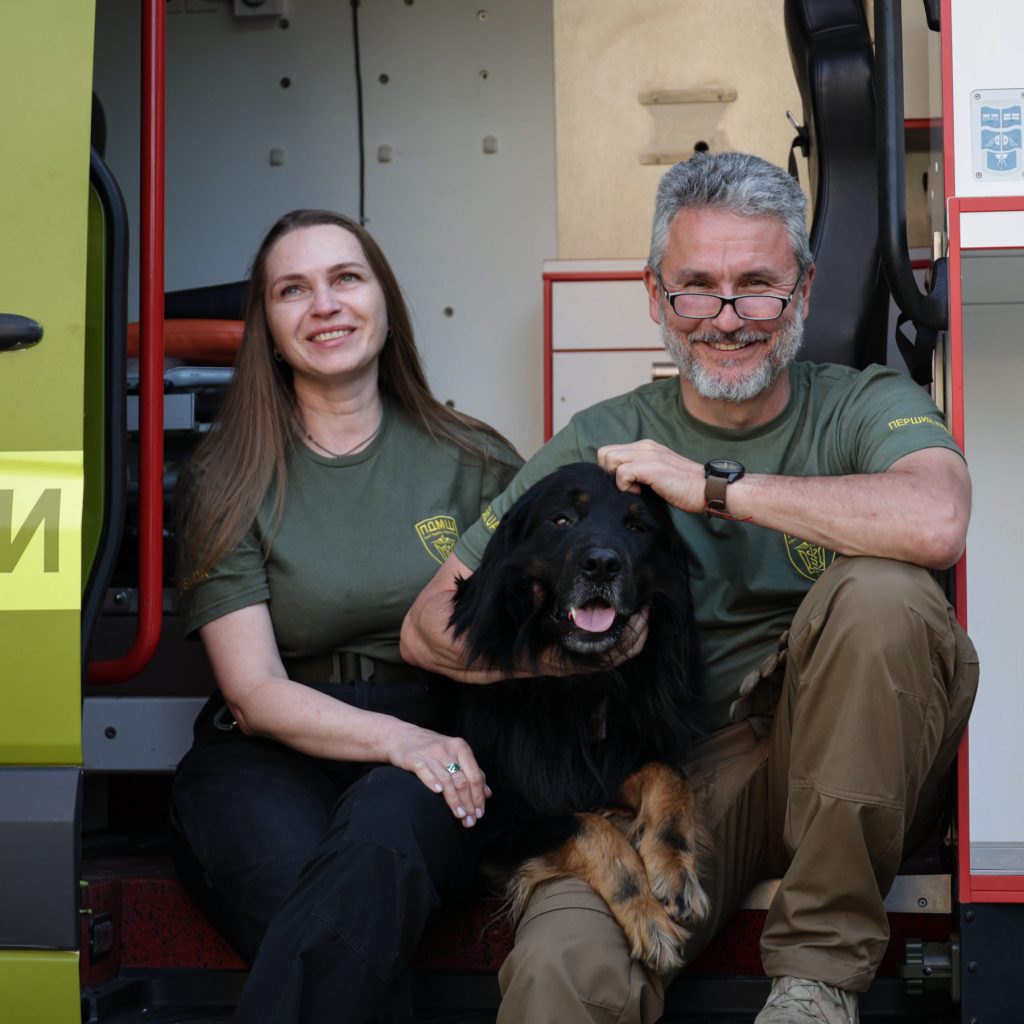
“From the first day of the invasion, our volunteers have been among the first to go to combat zones across the country, risking their lives to care for wounded civilians and fighters,” he explains.
They have even cared for wounded Russian soldiers “Who are left stranded by their own comrades,” he says. It costs them about $100,000 to operate each month and he estimates that rescuing wounded is worth between $40 to $60. “A very low price,” he insists.
Still, in Ukraine, people also live with pain. Father Andrii Holavin is the Ukrainian Orthodox Church parish priest in Bucha, a village north of the capital, which has become a reference point for the atrocities committed by the Russian invaders against the Ukrainian population.
He is tall and thin, wears a gray robe, and keeps a huge wooden rosary around his neck. In the imposing white church with golden domes over which he presides, he held many funeral masses for the murdered.
“In the Bucha region, 416 people were killed. Many of the bodies were found in the streets and the largest mass grave was precisely next to the church. There were 116 people buried here, among them 30 women and two children,” the Ukrainian religious detailed pointing to the extensive field where they were buried and where they placed an altar in their memory.
He also says that they found remains of bodies that were identified with DNA tests and that correspond to three more people.
Holavin explains that, unlike other Ukrainian cities, there are not so many damaged buildings in Bucha. “You are not going to observe major destruction here, because there was no fighting here and our Army was not here. Those who died here were civilians who suffered during the occupation,” he says.
Since March 2022, when Russian forces left Bucha, Ukrainian authorities and international forensic teams searched for mass graves to count the number of civilians killed, which they denounced as genocide. Russia claims these are “unfounded allegations.”
However, the priest remained at the church and set up an exhibition with photos showing the savagery of the Russian invaders. He goes through each photograph and reminisces about their stories. “They were our neighbors,” he repeats.
He stops and points to the image of a man’s body, abandoned in the street next to his bicycle and dog. “They say these are lies, that we staged this moment and that we could have placed that body and that bicycle there for the photograph, but that sad dog next to his master, it can't be faked,” he sentences.
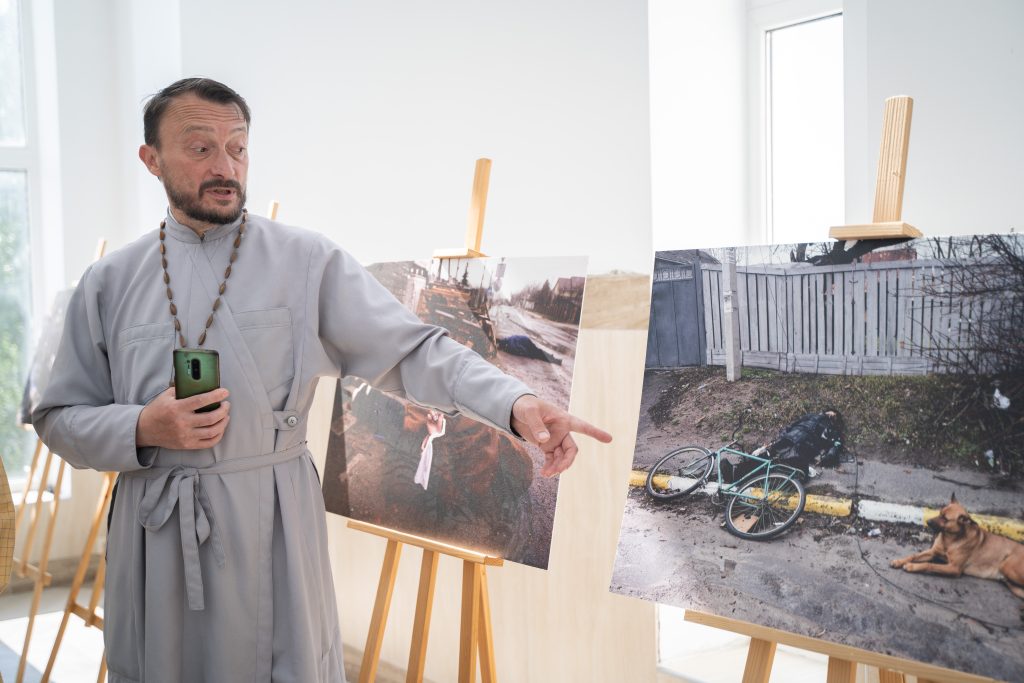
Like Father Andrii Holavin, military chaplain Andrii Zelinski, who belongs to the Greek Catholic Church, explains that it is painful to see how Russian church leaders have not condemned the brutal massacre. On the contrary, they have blessed the Russian military sent to murder innocents.
“In times of war, many people lose faith. Many dead, many wounded, families separated,” he laments.
Holavin has witnessed the pain experienced by the population, as he has brought comfort to the hardest-hit areas since the first Russian invasions of Ukraine. “This war began in 2014, it is something that was already happening but that many have wanted to ignore,” he assures.
That is why both religious men are blunt: “In order for there to be forgiveness there must first be justice.”
In the streets of Ukraine hardly anyone speaks Russian anymore. It’s a silent form of protest against the invasion. On the contrary, they want to erase all references to that country.
Proof of this is the now-renamed Freedom Arch of the Ukrainian people, formerly known as the Arc of Friendship of Peoples, a 35-meter Soviet-era monument on the banks of the Dnieper River, in the capital.
Since 2018, a group of human rights activists painted what resembles a crack on the top of the arch to represent the deteriorating relations between Ukraine and Russia, following the Russian occupation in Crimea and the Dombash.
“Street names that had Russian names have been changed,” Kristina, my 23-year-old Ukrainian interpreter, who is taking refuge in Kyiv after the occupation in the Dombash, explains to me. She, along with her husband, Olekssi Otkydach, have found themselves becoming escorts for international journalists. They use their social networks to report what is happening in Ukraine. And they do it in Spanish.
The war has changed everyone's life. Like that of Serhii Gerasymenko, a 35-year-old man who studied business studies and who was doing some paperwork in Russia when the invasion began. When he returned and went to offer himself to the recruiting office, he was told that he would be used “only as a carrier.”
Since then he has received a year of military training in different types of operations and now feels he is one of the Ukrainian Army's defense. He admits that when there are constant explosions and shelling he has felt fear. “But I believe that everyone is going to live the time given to him by God and that's what I cling to,” he assures during the meeting we have at the Arboretum Oleksandriya, located in the city of Bila Tserkva.
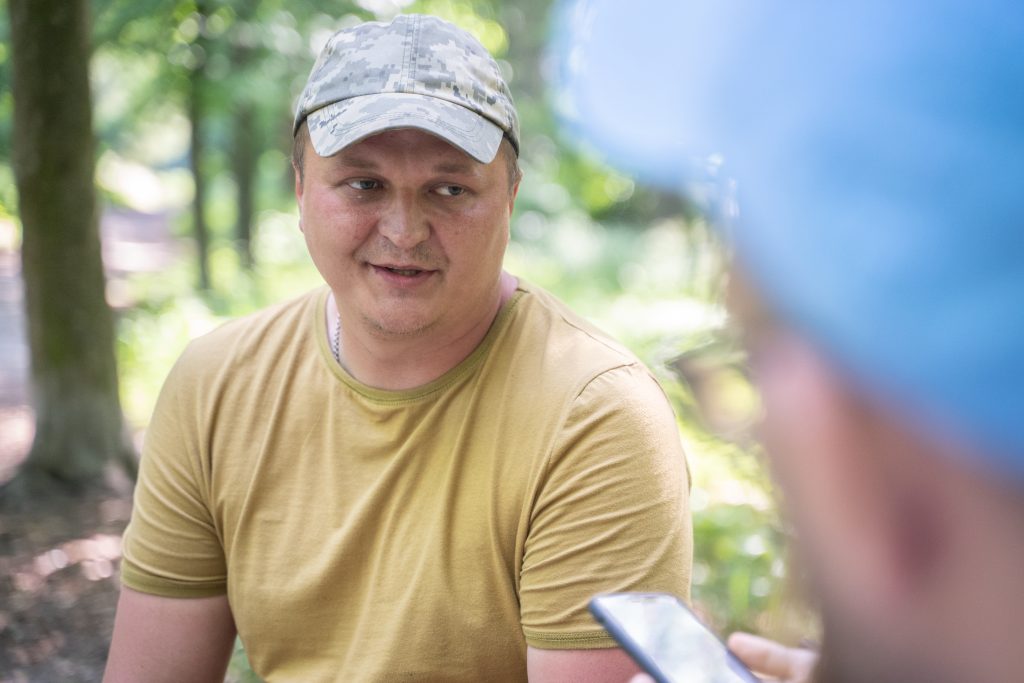
He understands that not everyone can go into battle because “if they are not prepared, they are not going to help much.” But he also shares that sometimes the fatigue is too much.
This man, the father of two girls aged eight and twelve, confesses that when he was a child he wanted to be a policeman or a soldier. “But I never imagined I was going to be one,” he points out.
“And now what would you like to be when the war is over,” I ask him.
“I just imagine myself resting,” he answers with a shy smile.
This article was originally published in Spanish in Confidencial and translated by our staff.
PUBLICIDAD 3M
Periodista nicaragüense, con dos décadas de trayectoria en medios escritos y digitales. Fue editor de las publicaciones Metro, La Brújula y Revista Niú. Ganador del Grand Prize Lorenzo Natali en Derechos Humanos.
PUBLICIDAD 3D